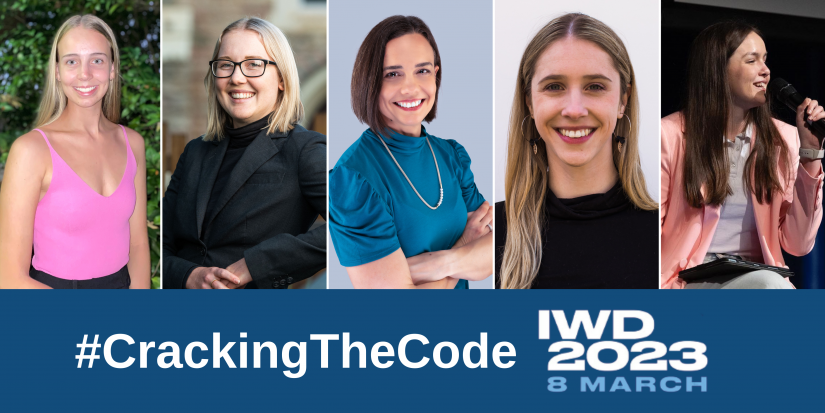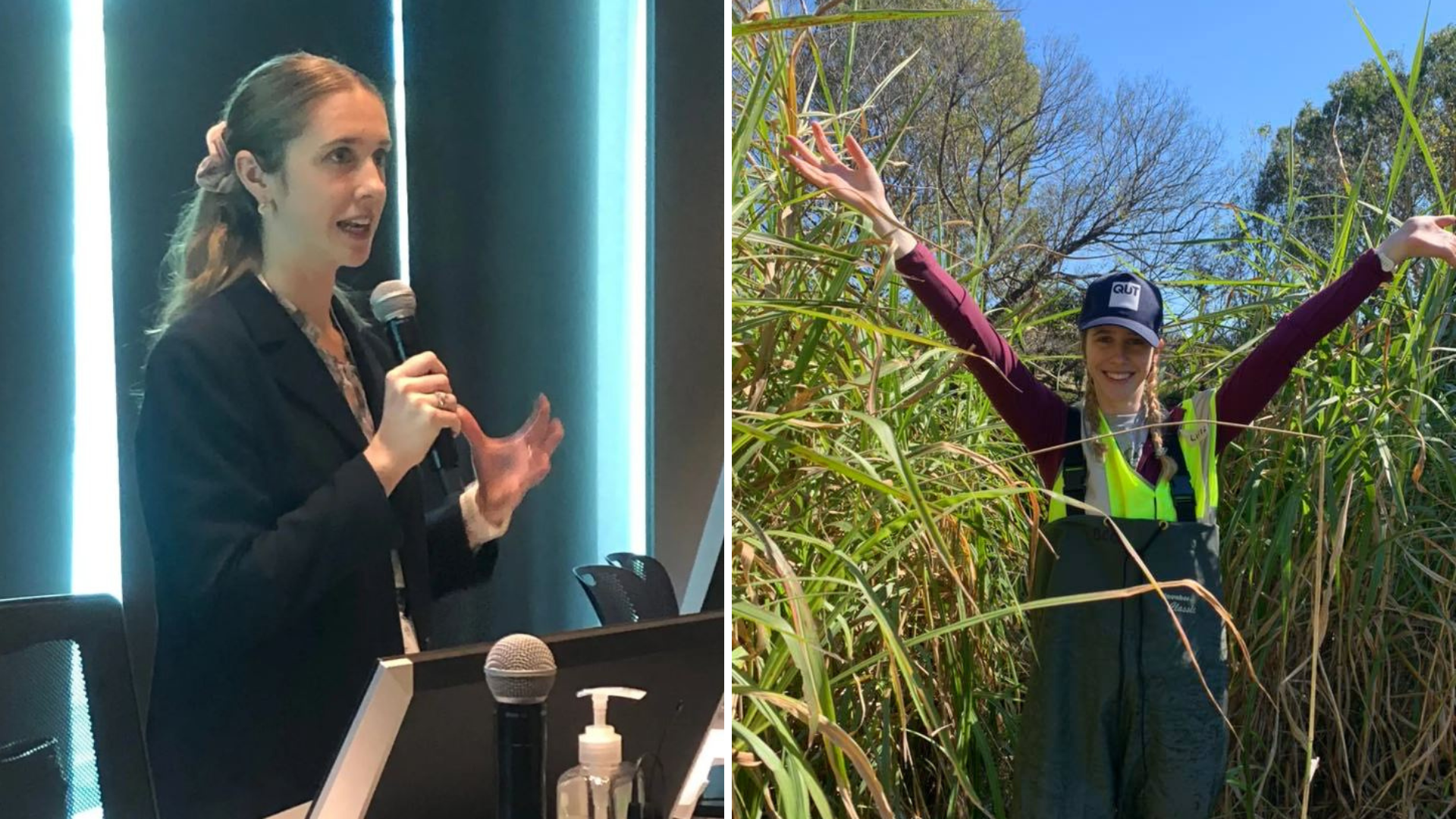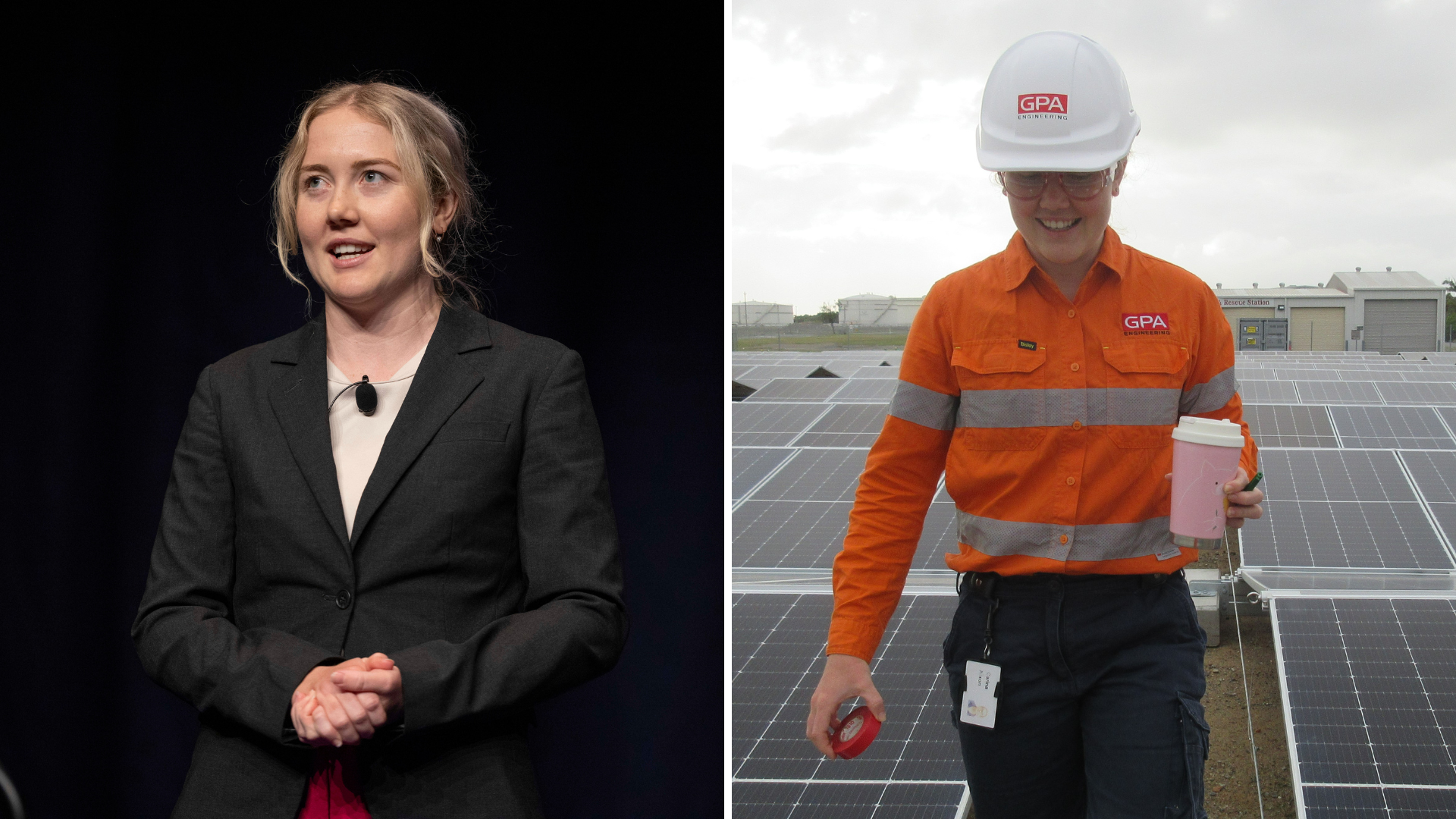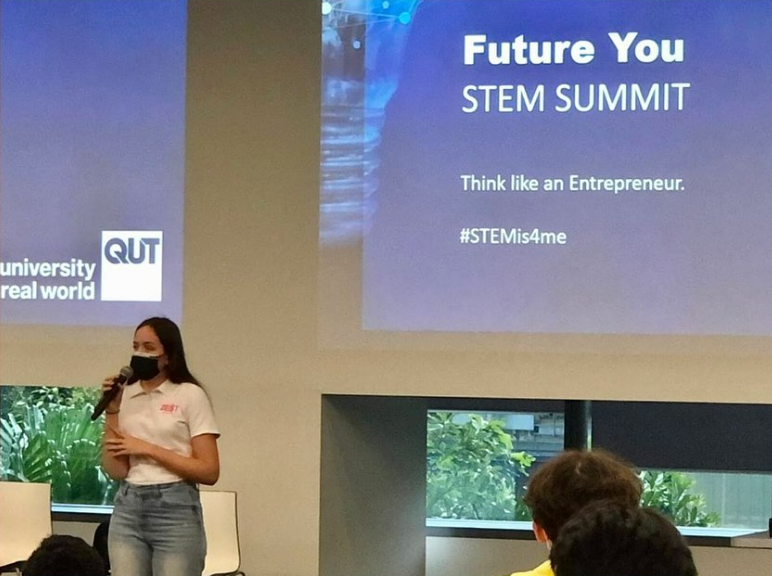
Kaitlin Loeffler-White, 6 March, 2023 | From left to right: Maggie-May Hornigold (Bachelor of Business (Management)/Bachelor of Engineering (Medical Engineering) (Honours), Carina Nixon (Bachelor of Business (Management)/Bachelor of Engineering(Mechanical Engineering) (Honours) 2021, Michelle Keeffe (PhD Candidate & QUT Business School Sessional Academic, Olivia Walker (Bachelor of Laws (Honours)/Bachelor of Science (Environmental Science) 2022 and Sarah Eisemenger (Bachelor of Business (Management)/Bachelor of Engineering (Mechatronics) (Honours).
March 8 marks International Women’s Day, an annual global celebration of women's social, economic, cultural, and political achievements. While this progress is widely celebrated, it is acknowledged that there is still much work to achieve true gender equality globally.
This year’s theme, #CrackingTheCode: Innovation for a gender-equal future, highlights the role that bold, transformative ideas, inclusive technologies, and accessible education can play in combatting discrimination and the marginalisation of women globally.
QUT’s Faculty of Business and Law invited students, staff and alumni to join the conversation to celebrate International Women's Day and discuss #CrackingTheCode.
For recent Bachelor of Laws (Honours)/Bachelor of Science (Environmental Science) graduate Olivia Walker, this year’s theme represents the need for society to solve the issue of gender equality.
“To me, this theme signifies the urgency to address the persistent issue of gender equality,” She said.
“I think we are all aware of gender inequality worldwide, but this theme emphasises the need to move beyond awareness and take action towards finding solutions.
“To achieve this, I believe we require innovation in all aspects of society, including individual growth mindset, cultural norms and business practices.
“Thinking creatively and implementing new and progressive ideas is essential to make significant progress towards gender equality.”
Third-year Bachelor of Business (Engineering)/Bachelor of Engineering (Honours)(Mechatronics) student Sarah Eisenmenger added, “STEM, especially coding, is filled with many misconceptions.”
“Many people, especially young girls, feel that coding is too hard to learn and often fall into the stereotypes that label coding as a ‘boys’ thing.
Olivia Walker (Bachelor of Laws (Honours)/Bachelor of Science (Environmental Science) 2022
“To me, #CrackingTheCode represents overcoming these misconceptions through innovative content delivery to create gender-equal opportunities for STEM curriculum.”
Michelle Keeffe, a sessional academic in QUT’s School of Management, began her career as a systems engineer. She shares that she was the only, or one of few, women in her class and work environments and found it difficult to navigate gender-related barriers.
“Given the absence of female role models who had successfully surmounted these obstacles, I decided to pursue a different career,” she says.
 Now a QUT Business School PhD candidate, Michelle’s research focuses on diversity, women in technology start-ups and entrepreneurship.
Now a QUT Business School PhD candidate, Michelle’s research focuses on diversity, women in technology start-ups and entrepreneurship.
“My research represents an opportunity to contribute to the next generation of women in STEM,” she continued.
“By drawing lessons from our experiences, devising innovative strategies to promote gender equality, and challenging the current norms, I believe we can #CrackTheCode and create a future where gender equality is a reality.”
While the industry is progressing, women still only hold two in every ten science, engineering, and information and communication technology jobs.
For current Bachelor of Business (Management)/Bachelor of Engineering (Honours) student Maggie-May Hornigold, combining business and STEM skills is advantageous in moving the needle forward.
“Increasing versatility and perseverance with my education attracted me to a double degree in business and engineering to utilise vital business acumen and achieve greater results in the STEM field,” she says.

Carina Nixon (Bachelor of Business (Management)/Bachelor of Engineering(Mechanical Engineering) (Honours) 2021.
Bachelor of Business (Management)/Bachelor of Engineering (Honours) (Mechanical Engineering) alumna Carina Nixon, who decided she wanted to be an engineer at age 16, agrees that studying for a double degree is beneficial.
“It wasn’t until I applied to QUT that I found out I could study a double degree in business. My business degree made me a better engineer.”
In addition to studying, Sarah is the founder of Sunshine Coast-based business Zest Robotics and says undertaking a double degree has opened many doors for her career.
“It’s given me double the networking opportunities and an intersectional skill set.”
When discussing the founding of Zest Robotics, she added, “I wanted opportunities in STEM to reach beyond the bias, break boundaries and smash stereotypes.”
“So, in the coming years, I founded my business, ZEST Robotics, which is dedicated to increasing STEM confidence in young girls and changing the conversation around women in STEM.
“Studying Business and Engineering at QUT has allowed me to grow my business beyond what I thought possible while fostering my industry skills.”

Sarah Eisemenger (Bachelor of Business (Management)/Bachelor of Engineering (Mechatronics) (Honours).
When asked what advice she would give women looking to embark in a STEM career, Olivia says, ‘knowing your why’ is important.
“This will help guide you throughout your STEM career and keep you on track to achieving purposeful work. Be visible - don't be afraid to claim your seat at the table,” she said.
“You belong there. Use your voice, and don't be afraid to speak up. Your thoughts and opinions are worthy of being heard.”
Maggie-May echoed this advice.
“Don’t be limited by what you know or think you can do – be brave, challenge yourself and never be afraid to try something new,” said Maggie-May.
“Form your journey, create connections, and follow your passion.”
For Sarah, STEM role models are a fundamental way to encourage women to pursue STEM and aid in developing STEM careers.
“Building a network of peers within the industry allows more opportunities to break gender bias and change the conversation around women in STEM,” Sarah said.
She shares that meeting 2012 Young Australian of the Year, Marita Cheng, has greatly inspired her.
“I had the opportunity to meet her in 2018 during Brisbane’s National Science Week while attending the STEM Girl Power Camp. During this time, I had been experiencing first-hand the severe lack of girls in STEM, and after conversing with Marita, I felt more comfortable taking the first steps in founding ZEST Robotics,” she continued.
For Olivia, primatologist and anthropologist Dame Jane Goodall, DBE is a major source of inspiration.
“To me, she represents one of the greatest pioneers and advocates for protecting and conserving wildlife. Her decision to dedicate her life to this cause means she represents perseverance, determination, and hope for a better future,” she said.
Oliva says Jane has made her realise a very important thing.
“Education drives knowledge, knowledge is power, and with power, anything is achievable,” added Olivia.
QUT is UN Women Australia’s exclusive education partner for QLD and ACT. To learn more about UN Women Australia, visit their website.
To learn more about studying a double degree at QUT, click here.
